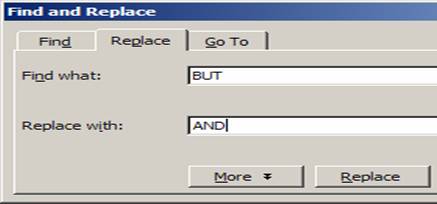Thinking about how we use the word ‘but’ in our common conversations, this week I made a strange observation. ‘But’ is a blocker, a stopper, a false yes and most of all: a crusher of commitment.
‘Yes but’ = ‘No’
‘But’ is the ultimate word to give away my power over a situation: either by avoiding to pronounce a powerful ‘no’, or by making you the effect of the situation instead of the cause. Some examples:
1. Avoiding ‘no’:
- I’ll do it now, but first I need to print that document (Meaning: ‘No, I’ll do it after I finished printing’)
- I can fix that problem for you, but it may take some time (Meaning:’ forget it’)
2. Giving away power:
- ‘Who is in charge here?’ ‘I am, but normally I do this job with my colleague, who is out of office now.’ (Meaning: I’m not prepared to commit myself if my colleague is not holding my hand’)
- ‘Are we going to make that deadline?’ ‘Yes, but there are some open issues that we need to decide on first’. (Meaning: ‘not quite’)
Try the alternative; ‘And’
Funny things happen whenever you change the ‘but’ by ‘and’. The exclusion of commitment disappears and you find yourself still in charge of the situation. One step further: if you do this while you are speaking – whenever you feel a ‘but’ coming up, throw in an ‘and’ – you are forced to change whatever you were saying. In fact, you stop lying. The false ‘no’ becomes a statement of fact without exclusion, and without loss of power. Applied to the same examples:

1. Avoiding ‘no’=> being ‘yes’
- I’ll do it and first I will print that document (meaning: ‘I commit and I stay in charge of what comes first’ + note how the sentence was forces to become active because of the word change)
- I can fix that problem for you, and it may take some time (Meaning:’ Count on me EVEN IF it takes more time than we expected’)
2. Giving away power => staying in charge
- ‘Who is in charge here?’ ‘I am, and my colleague is out of office now.’ (Meaning: I am in charge here and now. Full stop. Note that some information automatically dropped which would otherwise decrease power)
- ‘Are we going to make that deadline?’ ‘Yes, and we will decide on those open issues first’. (Meaning: ‘We’ll make it here and now, whatever it takes’. Note that the ‘and’ forces you to make the sentence more active)
Becoming aware of what happens whenever we use the word ‘but’ or ‘and’ has been my favorite experiment over the past weeks. I found myself pausing a few seconds after pronouncing ‘and’. It was instant transformation. 🙂

